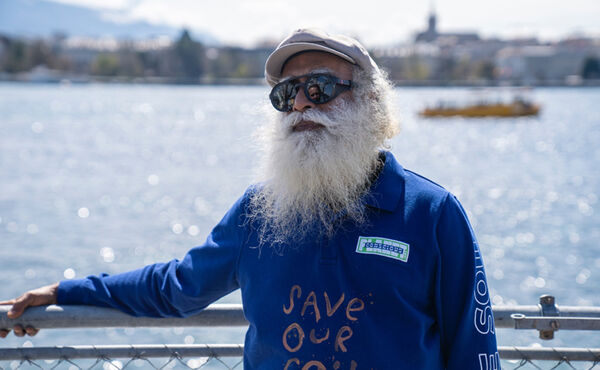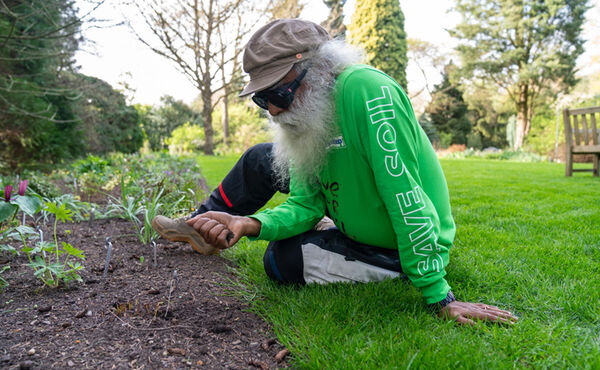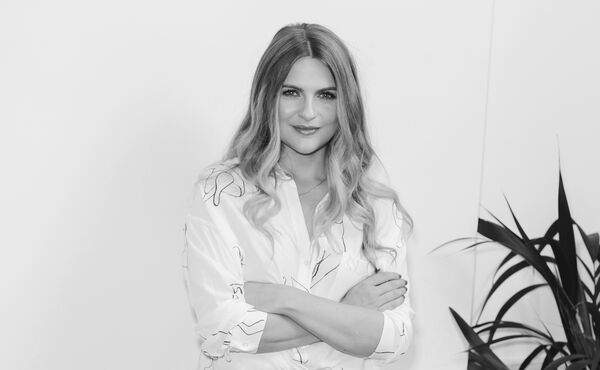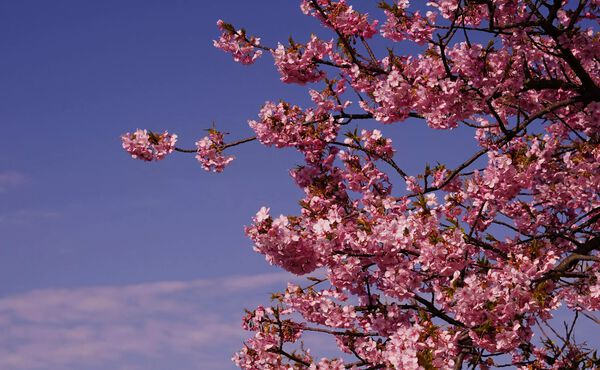We know trees are good for the air and animals that surround them, but they are also crucial for soil – an endangered resource that yogi, mystic and visionary Sadhguru says is vital to life.
There is plenty of soil in the world. In fact, if you think about it most of us come across soil every day, whether it’s the soil in our herb planter or the soil surrounding the trunks of the trees that line our streets. So why, then, are some warning that the world is facing ‘soil extinction’, and campaigning for this issue to be as widely talked about as the need to plant and protect trees?
Why soil quality is crucial
Topsoil – defined as the upper 12-24 cm – has the highest concentration of organic matter and microorganisms – and is where 95% of our food is grown. Without topsoil, feeding the global population will become a critical problem. Just one teaspoon of topsoil contains more microbes than there are people on the planet. Like all good things though, it takes time to make - around 1,000 years to generate just 3 cm, according to Maria Helena Semedo, who is currently Deputy Director-General of the Food and Agriculture Organization.Which makes the expert predictions that we only have 80-100 years of quality soil left (thanks to numerous factors including climate change) even more worrying.
Poor soil leads to poor nutritional value in the foods we eat. A lack of microbes means that, in time, soil would become like sand - arid and inefficient for harvesting food. The World Resources Institute notes that “degraded soils, especially in Africa’s drylands, may affect one quarter of the world’s cropland.”It calls for experimentation into rebuilding soil health as one of the ways to sustainably feed people in the future.
How Sadhguru is saving our soil
This is why Sadhguru, yogi, mystic and visionary, and one of the top 50 most influential people in India started the global Save Soil movement, to bring people together to raise awareness and to stand up for soil health. Supported by the likes of Deepak Chopra, Dr. Jane Goodall DBE, Rosario Dawson, Tony Robbins, the Dalai Lama and more, Sadhguru’s goal is to petition world leaders to commit to bring back at least 3-6% of organic content in our soil. So committed is he to raising awareness, that in 2022 embarked on a 100-day 30,000 km journey from the UK to India across 25 nations to meet citizens, leaders and experts to spread the word.
Because it’s not just our food at stake – although that should be motivation enough. Campaigners like Sadhguru point out the environmental impact too. Organic matter in nutrient-rich soil can hold up to 90% of its weight in water and releases it slowly over time, making it vitally important in drought-prone areas. But depleted soil cannot absorb or regulate water flow, which in time would lead to water scarcity, droughts and floods.
And while climate change is affecting the quality of our topsoil, the lack of rich vital soil is affecting climate change too. Carbon stored in soil is three times that in living plants, and two times that in the atmosphere. If the world's soils are not revitalised, they could release 850 billion tonnes of carbon dioxide into the atmosphere, more than all of humanity's emissions in the last 30 years combined.
For more soil insights visit consciousplanet.org.
So, what can we do to save soil?
Well, don’t forget about trees, for a start. Studies have shown that tree growth and conservation are vital components in the regeneration of soil quality and the shade from trees have been proven to improve soil quality. Plus, a study into shade trees, trees grown primarily for shade, notes that they “add leaf litter to the soil acting as a mulch and adding organic matter and minerals in the soil.”
Rituals aims to Plant, Protect and Restore 5 million trees by the end of the year. And, as part of our Rituals Earth Week 2022(18th April- 24th April) that supports global Earth Day on (22nd April), for every refill you buy, we will support one tree not just during Earth Week but every time you buy a refill. Meanwhile, Sadhguru encourages us all to use our voices - spreading the word about this lesser-known issue whether via social media, speaking to your local politicians or with friends and family. To find out more, we managed to catch-up with him during his epic bike ride. Here’s what he had to say…

Rituals: Can you remember when and where you first became aware of how perilous the future of soil was?
Sadhguru: This journey, in terms of experience, started very early in my life because I have always been outdoors, and I have a certain sense of the land. So, my engagement has been very long-term but being action-oriented came in 1998. In 1998, a team of experts predicted that by 2025, Tamil Nadu (a state in India) would become a desert. I don’t like predictions. People make predictions based on statistics and cold figures; they do not take into account human aspiration and longing, and what beats in the human heart.
I decided to drive around Tamil Nadu and take a look. I realized that we might not even make it to 2025! Small rivers had dried up and homes were built on riverbeds, and there is not enough soil moisture for even palm trees –desert vegetation –to survive. So, we started a project called Project Green Hands to plant 114 million trees, enough to bring at least 33% green cover to Tamil Nadu's land area, which was the national aspiration. Till now, we have planted 65 million trees.Since then, I have been shouting about soil. It is not that we suddenly thought of the "Conscious Planet –Save Soil" movement. For the last few decades, we have been working on this. In many ways, whether it was Project Green Hands, or later initiatives of Rally for Rivers or Cauvery Calling, they are not different things –it has all been about soil. This is why we have taken up the Conscious Planet –Save Soil movement. As a part of the movement, we are trying to touch at least 3.5 billion citizens across the world, to impress upon all political parties and governments to take to long-term soil regeneration policies.
Rituals: Why did you choose to travel by motorbike?
Sadhguru: I am doing a lone motorcycle ride from London to southern India, covering 30,000 km in 100 days. It is not a joyride. Along the way, we have fixed up appointments with various heads of state, agriculture and environment ministers, influencers and well-known personalities. We have also prepared a general policy document with special editions for each region of the world. We have written to 730 political parties in the world to bring soil regeneration into their political agendas.
The idea behind this motorcycle ride is just for this –if I fly into different countries, doors will not open. They have to see that I am staking my life a bit. I am doing this because as a generation, we have a challenge and a privilege that we could be that generation which turned back from the brink of a disaster. Or we could be that generation which slept through and fell over. So, this needs to happen now.

Rituals: You’ve said “Do we want to be a regretful generation or a responsible generation?” but right now in the world there seems so much to be responsible about! Why do you believe this is THE one issue we should all unite behind?
Sadhguru: When I was at one of the UN agencies, they asked me, "Sadhguru, what are the three most important things that we need to attend to?" I said, "Soil, soil and soil!" because it is connected to everything. Because if you fix this one thing, everything will be fixed naturally. Whether you want to fix reverse the climate change, or do carbon sequestration, or limit the temperatures rising in the world, or resolve water scarcity, we need to fix the soil.
Soil is a very significant carbon sink and the largest water soak on the planet. The maximum amount of carbon was always in the soil, but now a lot of it is in the atmosphere where it should not be, and it is causing global warming. The same soil which can take in carbon dioxide and methane from the atmosphere is now releasing it, simply because we are leaving the land plowed and open, without any microbial activity. As the microbial biodiversity decreases, the expulsion of gases from soil increases. Well, this is also happening because of emissions from industries, and burning fossil fuels coal, oil, etc. But nearly forty percent of global warming is happening simply because of soil degradation. If soil is rich, there will be water. If soil is rich and there is enough vegetation on it, the air will be purified. So, our attention has to shift to soil.
If we start now, in 15–25 years, there will be a significant turnaround. But let us say we wait for another 25–50 years, and then try to turn it around, they say it may take up to 200 years. And that period is going to be disastrous for human beings as a species.
Rituals: How do you keep positive when the stakes are so high and so little appears to change?
Sadhguru: People are all thinking that governments are not doing anything. But in a democracy, if the people do not give a mandate to the government, how will the governments make long-term investments? People are asking for trinkets, so governments are offering trinkets. If people express long-term commitment, governments will do it.
Till now, there has been a spectacular response in every nation from the people. Governments are also extremely positive, but they are a little muted in their response because of the war in Ukraine and the refugee influx that is happening into these nations. Otherwise, things have moved in a very wonderful way.
Six Caribbean nations have signed MOUs with us and another eight, including a few South American countries, are in the pipeline. The Commonwealth of Nations, which accounts for a population of 2.5 billion, have made a declaration that they will be with us. Several United Nations agencies have partnered with us –United Nations Convention to Combat Desertification (UNCCD), United Nations Environment Programme (UNEP), World Food Programme (WFP) –as well as the International Union for Conservation of Nature (IUCN). We met Italy’s agriculture minister in Rome. We met an important person in the Vatican City’s unit for the environment. We have signed an MOU with "4 per 1000" organization in France. They are fully with the movement. I met so many other people, and everyone is supporting it. They were all just waiting for an idiot to bell the cat. Here I am!
Rituals: Rituals has dramatically extended its commitment to plant, protect and restore trees this year –how will more trees help the quality of soil?
Sadhguru: The desertification of our soil is happening at such a rapid pace because every time you grow something, the organic content is being taken by the crops, but nothing is being put back into the soil. In a tropical forest, the organic content in the soil, from plant litter and animal waste, would be somewhere around seventy percent or more. In agricultural soils, the minimum organic content should be three to six percent. But right now, in nearly forty percent of the world's agricultural lands, the organic content is below 0.5%.
So, what are we going to do? There are only two ways to put back organic content into the soil–green litter from vegetation, and animal waste. Bringing back animals into the farm is out of question because people have gotten used to the comfort of the machine. So, the best option we have is to bring back vegetation.

Rituals: What’s the one thing each of us can do to make a difference?
Sadhguru: Right now, everybody wants to get their hands in the earth because they are inspired. That is not what we need. If we are interested in a solution, not just personal satisfaction, soil regeneration has to be enshrined in the policy of every nation. Because right now, someone may be doing a great job with the soil on their farm, but what is the guarantee that the next generation will continue that? They may turn it into a desert. That is what we have done in one or two generations, isn’t it? So how we treat our soil has to get instituted in the policy. We must understand soil is not our property. It is a legacy. It has come to us from previous generations. It is very important we hand it over to future generations in its living condition –as a living soil, not as dead material.
The European Union was about to come up with a legislation or a recommendation for all the nations to go in for regenerative agriculture, which would have been very positive, but unfortunately, citing the war, they have postponed it. War is an unfortunate reality. But postponing vital things is another unfortunate reality. I don't think we should postpone. Vital things, especially regarding ecology, must continue to happen. If things are stuck because of the war, maybe a six-month postponement is okay –but not years of postponement. The people of Europe should at least ask them to prepone it. You can write to your local leader, and get all your friends and children to write to them. If you get a million letters to your leaders, the job will be done. They cannot ignore it.
You can read all about our 10% Profit Pledge that aims to better the balance for people and planet, here.










